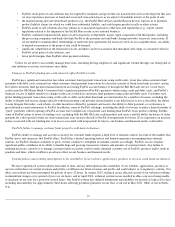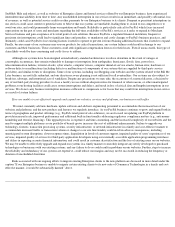eBay 2013 Annual Report Download - page 30
Download and view the complete annual report
Please find page 30 of the 2013 eBay annual report below. You can navigate through the pages in the report by either clicking on the pages listed below, or by using the keyword search tool below to find specific information within the annual report.
Any factors that reduce cross-border trade could harm our business.
Cross-border trade has become an increasingly important source of both revenue and profits for us. Cross-border transactions using our
websites and mobile platforms generally provide higher revenues and gross margins than similar transactions that take place within a single
country or market. We generally earn higher transaction fees for cross-border transactions involving PayPal, and our Marketplaces business
continues to represent a relatively straightforward way for buyers and sellers to engage in cross-border trade compared with other alternatives.
Cross-border trade also represents our primary (or in some cases, only) presence in certain markets in which Internet and mobile device use is
accelerating and we have a limited (or no) domestic Marketplaces business, such as Brazil/Latin America, China, Russia and various other
countries.
The interpretation and application of specific national or regional laws, such as those related to intellectual property rights of authentic
products, selective distribution networks, and sellers in other countries listing items on the Internet, and the potential interpretation and
application of laws of multiple jurisdictions (e.g., the jurisdiction of the buyer, the seller, and/or the location of the item being sold) are
extremely complicated in the context of cross-border trade. Some of these issues are involved in the L'Oréal and Louis Vuitton Malletier cases
(see “Item 3: Legal Proceedings” below). The interpretation and/or application of such laws could impose restrictions on, or increase the costs
of, purchasing, selling, shipping or returning goods across national borders.
In addition, our cross-border trade is also subject to, and may be impacted by, currency exchange rate fluctuations. To the extent the U.S.
dollar strengthens against the Euro, the British pound, the Australian dollar or other currencies, cross-border trade related to purchases of dollar-
denominated goods (or goods from those Asia-Pacific countries whose currencies tend to follow the dollar) by non-U.S. purchasers will likely
decrease, and that decrease will likely not be offset by a corresponding increase in cross-border trade involving purchases by U.S. buyers of
goods denominated in other currencies. Even if cross-border trade is not reduced, if more sellers who accept PayPal begin to offer their goods or
services in multiple currencies, and to arrange for withdrawal of balances to local bank accounts in multiple countries, this could reduce PayPal's
revenues from foreign exchange fees.
In addition to the risks above, any other factors that increase the costs of purchasing, selling, shipping or returning goods across national
borders or restrict, delay or make cross-border trade more difficult or impractical, including fluctuations in currency exchange rates, currency
restrictions, increases in postal or delivery service rates, postal or delivery service terminations, disruptions or interruptions, changes in the
business practices of the card networks or participating banks concerning dynamic currency conversion, import or export control laws, the
application of (or increases in) tariffs, duties or other taxes on imports or exports, customs enforcement, including delays at the border
attributable to customs inspections, enforcement of international intellectual property rights by rights holders or court rulings, or that otherwise
result in a net reduction in cross-border trade on our websites and mobile platforms would lower our revenues and profits and adversely affect
our business. As part of our ongoing efforts to drive more transactions and improve seller efficiency and buyer experience and trust, we are
evaluating opportunities to become more actively involved in different aspects of cross-border transactions, which could potentially expose us to
additional liability based upon the nature of our involvement in aspects of such transactions and/or the actions of our users in one or more
countries.
Our business is subject to online security risks, including security breaches.
Our businesses involve the storage and transmission of users' proprietary information. In addition, a significant number of our users
authorize us to bill their payment card accounts directly for all transaction and other fees charged by us. For example, PayPal's users routinely
provide payment card and other financial information, and Enterprise customers routinely provide payment card information and other
personally identifiable information which we maintain to facilitate the ease of future transactions. We rely on encryption and authentication
technology licensed from third parties to provide the security and authentication to effectively secure transmission of confidential information,
including customer payment card numbers, however, such technology may not be sufficient to protect the transmission of our confidential
information. In addition, advances in computer capabilities, new discoveries in the field of cryptography or other developments may result in the
technology used by us to protect transaction data being breached or compromised.
An increasing number of websites, including those owned by several other large Internet and offline companies, have disclosed breaches
of their security, some of which have involved sophisticated and highly targeted attacks on portions of their websites or infrastructure. Because
the techniques used to obtain unauthorized access, disable or degrade service, or sabotage systems, change frequently and often are not
recognized until launched against a target, we may be unable to anticipate these techniques or to implement adequate preventative measures.
Data security breaches may also result from non-technical means, for example, actions by a suborned employee. Our servers are also vulnerable
to computer viruses, physical or electronic
28
























